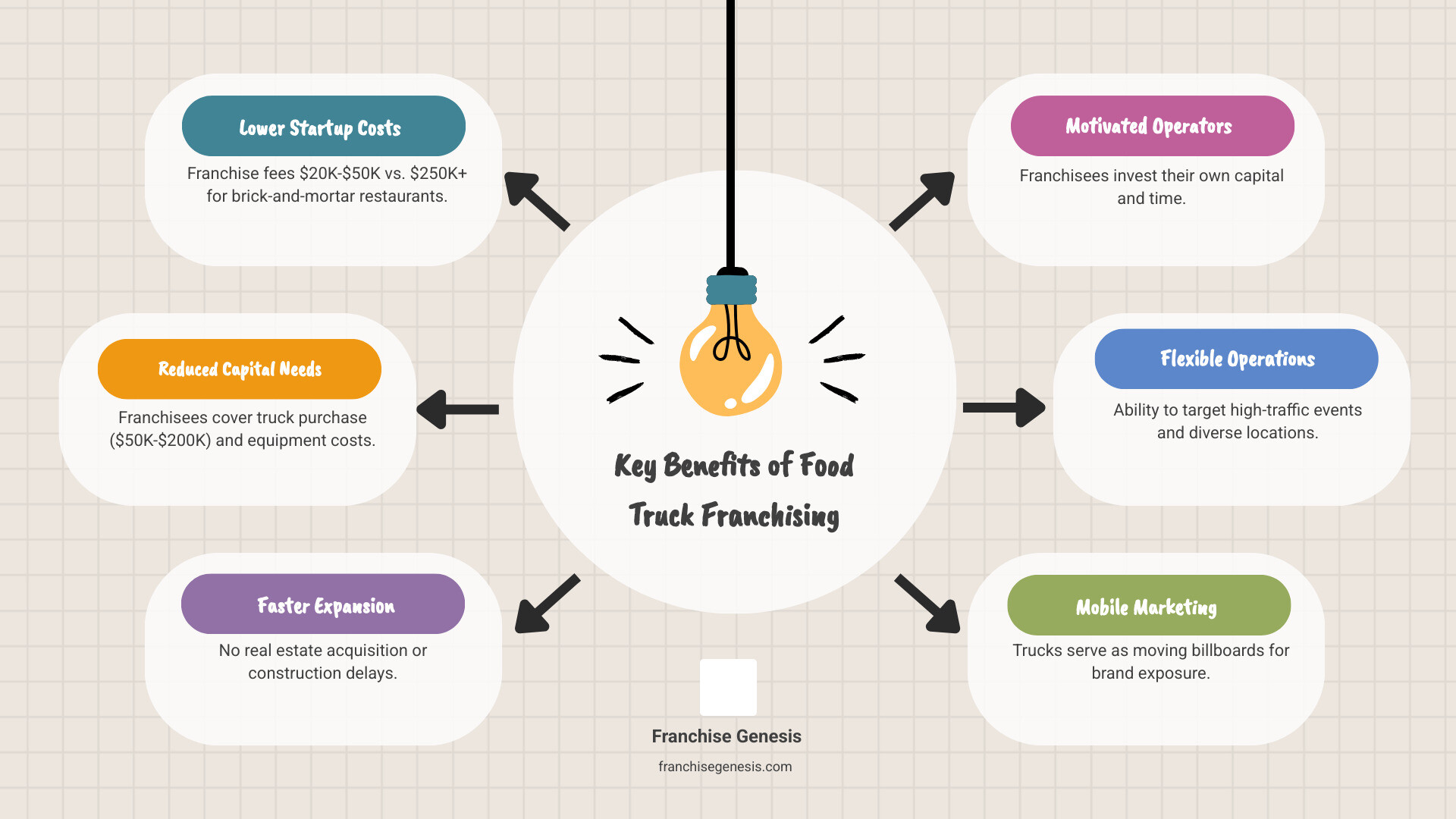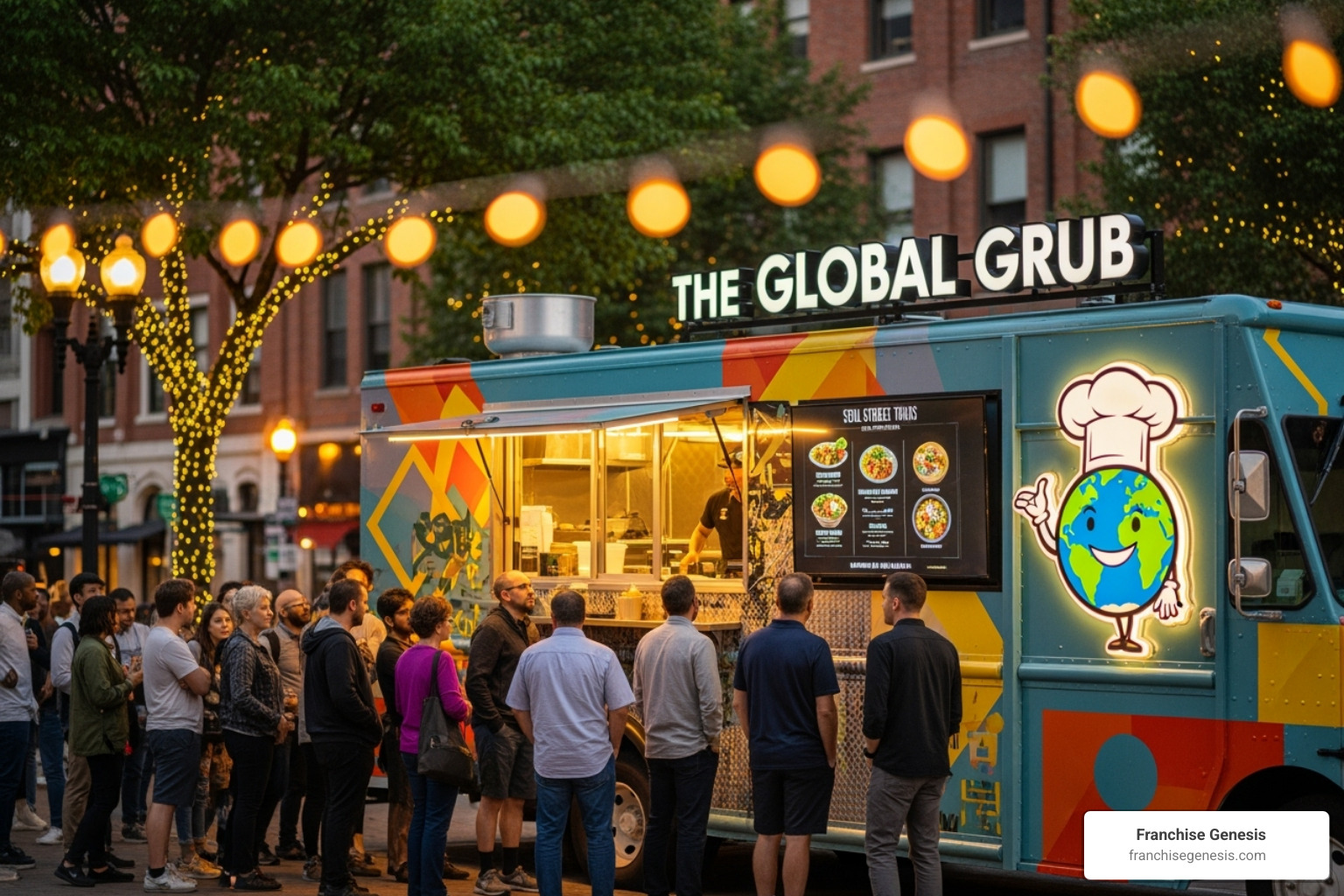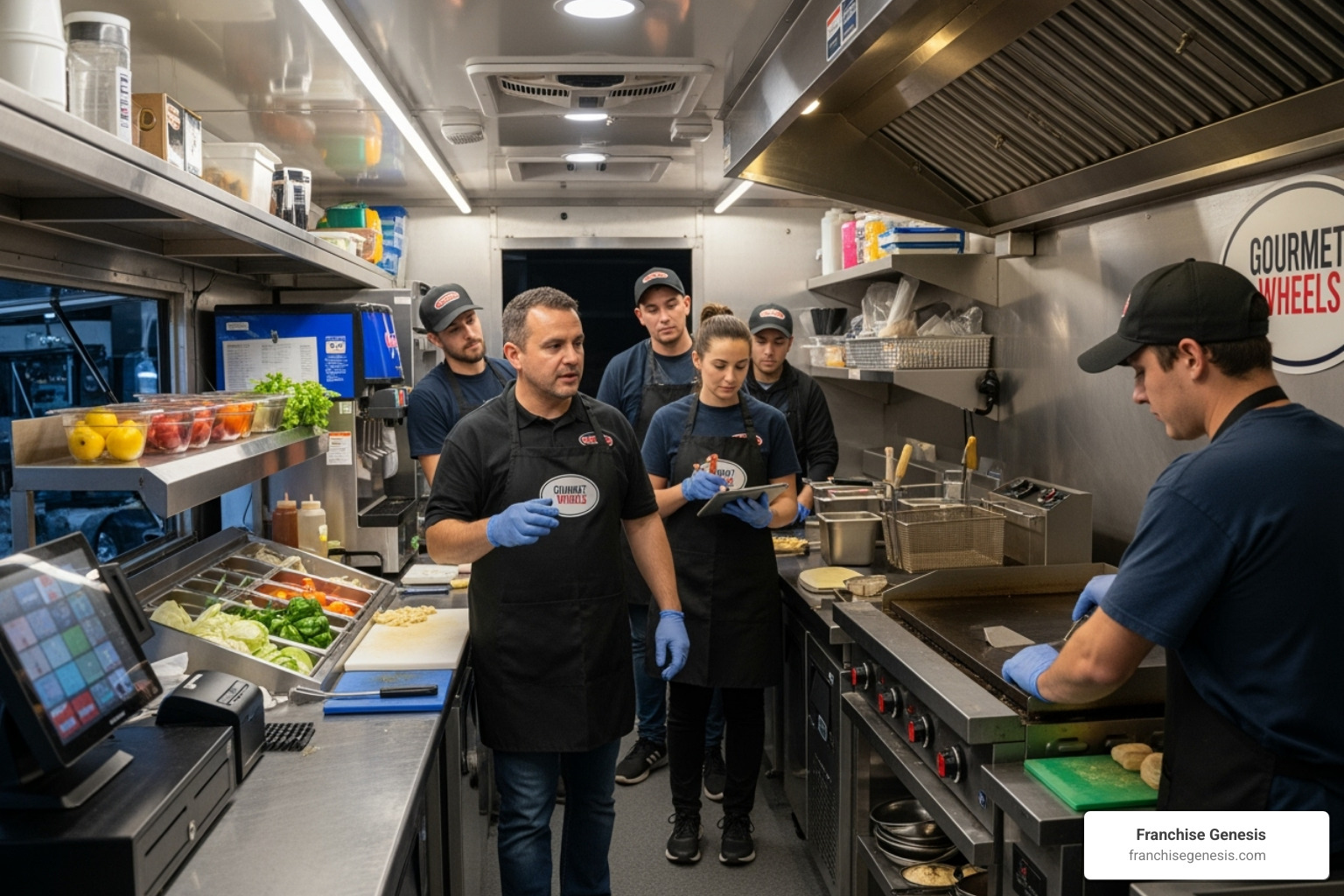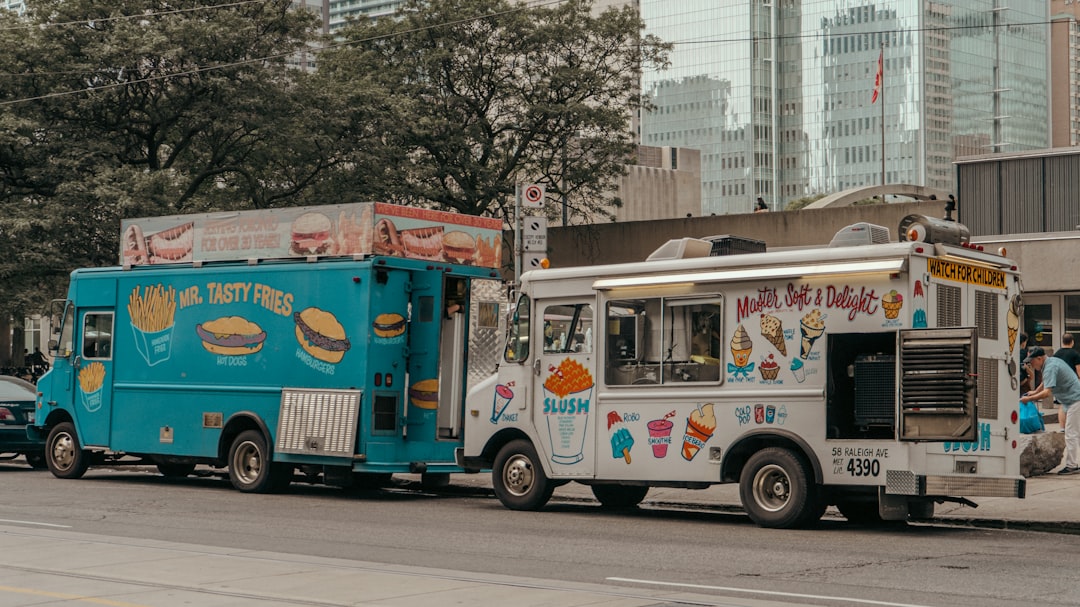Why Food Truck Franchising is the Hottest Expansion Strategy
For successful mobile food businesses, food truck franchising is a proven path to rapid growth, sidestepping the massive capital investment of traditional restaurant expansion. The U.S. food truck industry boasts over 51,000 businesses generating more than $2.2 billion annually, evolving from simple street carts to sophisticated culinary concepts.
Key Benefits of Food Truck Franchising:
- Lower startup costs – Franchise fees ($20k-$50k) are a fraction of brick-and-mortar restaurant costs ($250k+).
- Reduced capital requirements – Franchisees fund the truck ($50k-$200k) and equipment.
- Faster expansion – Avoid real estate and construction delays.
- Motivated owner-operators – Franchisees are invested stakeholders.
- Flexible operations – Target high-traffic events and locations.
- Mobile marketing – Trucks act as moving billboards, boosting brand exposure.
Food truck franchising allows you to replicate your winning formula across multiple markets, with franchisees assuming the operational duties and capital investments. Unlike independent expansion, which requires your own capital for each new truck, franchising enables growth through other people’s time and money.
As Vice President of Operations at Franchise Genesis, I’m Monique Pelle Kunkle. I’ve helped numerous mobile service businesses successfully transition to food truck franchising models, scaling some concepts to over 100 locations in their first year. My experience confirms that mobile businesses, when structured properly, have distinct franchising advantages.

Handy Food truck franchising terms:
The Mobile Advantage: Why Franchising Your Food Truck is a Smart Move
If you’ve built a successful food truck but are hitting a growth ceiling, food truck franchising is your secret weapon. Instead of draining your own savings to expand, you can partner with motivated entrepreneurs who invest their capital to launch your proven concept in new markets. They bring the hustle and local knowledge; you provide the brand and systems that already work.
Your food truck has built-in advantages over traditional restaurants that are highly attractive to franchisees:
- No monthly rent payments eating into profits.
- Lower utility and staffing costs due to a smaller footprint.
This lower overhead makes the path to profitability much clearer for potential franchisees. The flexibility to chase crowds at events, pivot locations based on weather, or adapt to seasonal changes means greater revenue potential and more successful franchisees.
But the biggest advantage is scalability. While you might open one new truck a year on your own, franchising could help you launch five or ten in the same period. Each new truck is a mobile billboard, spreading brand awareness far more effectively than traditional advertising.
Every franchisee is an invested owner-operator, not just an employee. Their personal investment drives a level of commitment that is essential for growth. You can harness this motivation through a well-structured franchise system. For more insights, see why you should franchise.
Food Truck Ownership Models: Independent vs. Franchise
Expanding independently means cloning your challenges with every new truck. Franchising means building a system that empowers others to succeed. Here’s a comparison from your perspective as the business owner:
| Feature | Independent Food Truck Expansion | Food Truck Franchise Expansion |
|---|---|---|
| Initial Investment | Your money funds every new truck ($75,000-$200,000 each) | Franchisees invest their own capital |
| Scalability | Limited by your bank account and time | Limited only by finding qualified franchisees |
| Operational Complexity | You manage staff, inventory, schedules for all locations | You support franchisees who handle daily operations |
| Brand Control | Complete control over every decision | Controlled through franchise agreements and training |
Your role shifts from operator to brand guardian and business coach. You trade hands-on control for scalable growth—a worthwhile exchange for most successful food truck owners.
Leveraging Mobility for Rapid Growth
Mobility is your competitive advantage for explosive growth. Your franchisees can go where the customers are, a luxury fixed-location restaurants don’t have.
- Event-based revenue: Festivals, concerts, and corporate events become goldmines with built-in hungry crowds.
- Catering opportunities: Corporate lunches, weddings, and private parties provide steady, high-margin revenue streams.
- Testing new markets: A franchisee can test a new town for a week with no long-term risk or lease commitments.
- Mobile billboards: Every truck provides organic marketing exposure as it moves through different neighborhoods daily.
This agility allows franchisees to maximize revenue in ways fixed restaurants can’t, leading to stronger performance. Learn more about maximizing these advantages with our franchise growth strategies.
Is Your Concept Ready? Key Ingredients for a Franchisable Food Truck
Before diving into food truck franchising, you must honestly assess your business. Just because your truck is successful doesn’t automatically mean it’s franchisable. A great concept needs a solid foundation to be replicated successfully by others.

- Proven profitability: Your truck must show consistent, strong profits for at least 18 months. Franchisees need to see a clear path to a healthy return on their investment (typically 15% or more).
- Strong brand identity: Your brand needs to create an emotional connection. It should be instantly recognizable and tell a story that resonates with customers and potential franchisees.
- Unique selling proposition (USP): What makes you different? Whether it’s a secret recipe or lightning-fast service, it must be something competitors can’t easily copy.
- Replicable systems: Your success cannot depend on your personal touch alone. If the business only works with you at the helm, it’s not ready. Every recipe, process, and customer interaction must be documented and teachable.
Developing a Replicable Business Model
Creating a replicable model means turning your special sauce into a step-by-step instruction manual. This is the core of food truck franchising.
- Operations Manual: This is your franchise bible, covering everything from prep routines and supplier lists to customer service scripts and cleaning procedures.
- Consistent Branding: Beyond the truck wrap, branding includes menu design, staff uniforms, and social media voice. Trademark your brand early to protect your intellectual property.
- Supply Chain Management: You need reliable suppliers who can serve multiple locations with consistent quality and pricing. This may involve negotiating with regional or national distributors.
If your current truck can run successfully with trained staff while you’re away, you’re on the right track. For more guidance, see our resource on converting your business to a franchise.
The “Sizzle Factor”: Gauging Franchisee Interest
The “sizzle factor” is what makes entrepreneurs want to be part of your brand. It’s the combination of elements that makes your opportunity irresistible.
- Customer Loyalty: Do regulars seek you out? Are people willing to wait in line for your food? This signals predictable revenue.
- Media Buzz: Local news features, food blogger reviews, and viral social media posts validate your concept’s appeal.
- Unsolicited Inquiries: When people regularly ask about opening their own version of your truck, you know you have a hot concept.
- Unique Menu: Your menu should be memorable and distinct, even if it’s brilliantly simple.
- Professional Design: Your truck is your storefront. An eye-catching, professional design signals quality to both customers and potential franchisees.
The Blueprint for Successful Food Truck Franchising
Once you’ve confirmed your concept is replicable, it’s time to build the legal and financial foundation for your food truck franchising empire. This phase is about creating the master blueprint. Skipping this step is a recipe for disaster.

Franchising is a heavily regulated industry with specific legal requirements designed to protect both you and your franchisees. When done correctly, this legal framework becomes a competitive advantage.
The cornerstone of your franchise system is the Franchise Disclosure Document (FDD). This comprehensive legal document is federally mandated and must be given to every prospective franchisee at least 14 days before they sign an agreement or pay any fees.
Beyond legal filings, you must define your financial structure. Deciding on franchise fees and royalty rates is critical, as these numbers will fuel your network’s growth and profitability.
Legal and Financial Preparations for Food Truck Franchising
Navigating the legal side of food truck franchising can feel overwhelming, but cutting corners will eventually lead to problems that could destroy your business. Here’s what you need to do:
- Hire a Franchise Attorney: You need a specialist who lives and breathes franchise law. This is not a job for a general business lawyer.
- Create the FDD: This document contains 23 required items detailing your business history, investment requirements, and financial performance representations. For food trucks, these disclosures should highlight metrics like gross sales, profit per transaction, and revenue sources.
- Handle State Registration: Many states require you to register or file your FDD before you can legally offer franchises. Your attorney will guide you through this patchwork of regulations.
- Trademark Your Brand: Protect your name, logo, and slogans. This gives franchisees confidence that they are investing in a legally defensible and exclusive brand.
- Budget for Franchisor Costs: Expect to invest $75,000 to $150,000 or more to properly launch your franchise program. This covers legal fees, marketing materials, and training development. For more details, explore our franchising insights.
Structuring Your Franchise Offer
Your goal is to create an offer that attracts qualified franchisees while building a sustainable business model. This is the financial DNA of your franchise system.
- Franchise Fees: For food trucks, these typically range from $20,000 to $50,000. This fee grants the rights to your brand and systems and covers initial training and support.
- Royalty Structures: While a percentage of gross sales (4%-8%) is common, many food truck franchisors use a minimum royalty or flat monthly fee. This ensures consistent revenue for you and encourages franchisee engagement.
- Marketing Fund Contributions: A 2%-4% contribution from gross sales creates a shared pool for brand-building activities that benefit the entire system.
- Territory Rights: For a mobile business, this is critical. Your franchise agreement must clearly define operating zones, rules for catering outside a home territory, and how to handle corporate accounts to prevent franchisee conflicts.
Structuring your offer is about creating a win-win scenario. To avoid common pitfalls, review our guide on franchise development mistakes.
Building a Winning System: Support, Training, and Avoiding Pitfalls
Once your legal framework is in place, your role shifts from food truck owner to franchise system builder. You’re no longer just serving food; you’re creating a support ecosystem that empowers other entrepreneurs to succeed with your concept.

Your franchisees are investing their life savings and dreams into your brand. Their success is your success. This means building a comprehensive support system covering everything from food truck franchising operations and marketing to technology and supply chain management.
Essential Elements of a Successful Food Truck Franchising Model
A thriving food truck franchising system is built on layers of seamless support. Franchisees are investing in your expertise, systems, and commitment.
- Comprehensive Training: Your program must cover every aspect of the business: food prep and safety, customer service, staff management, local marketing, financial reporting, and permit navigation.
- Ongoing Operational Support: Regular check-ins and a dedicated support team are crucial for troubleshooting issues and providing guidance long after the grand opening.
- Marketing and Social Media Strategies: Provide professional marketing materials and social media templates to ensure brand consistency while allowing for local customization.
- Strategic Location Selection Guidance: Share your expertise on identifying high-traffic areas, profitable event venues, and seasonal opportunities.
- Sustainable Packaging Guidelines: Guide franchisees toward eco-friendly packaging that aligns with your brand values and serves as mobile marketing.
For more on creating effective programs, explore our guide on franchise training success.
Common Mistakes New Franchisors Make
The path from owner to franchisor is filled with potential pitfalls. Based on our experience, here are the most common mistakes to avoid in food truck franchising.
- Inadequate Support: Underestimating the amount of ongoing guidance franchisees need is a top mistake. Poor support leads to frustrated franchisees and damages your brand’s reputation.
- Poor Franchisee Selection: Don’t rush to sign your first franchisees. A thorough vetting process that assesses work ethic, financial stability, and brand alignment is crucial to avoid long-term headaches.
- Underestimating Costs: Franchising requires a significant upfront investment from you, the franchisor, for legal fees, training development, and support infrastructure.
- Lack of a Standardized System: If your systems aren’t documented, teachable, and consistently enforced, you lose the brand consistency and operational efficiency that make a franchise valuable.
- Ignoring Mobile-Specific Challenges: Food trucks have unique operational needs. Your franchise agreement and royalty structure must address mobile-specific issues like territory management for events and catering to prevent conflicts and ensure fairness.
Frequently Asked Questions about Franchising a Food Truck
As experts in food truck franchising, we hear the same key questions from successful owners ready to expand. Here are concise answers to the most common inquiries.
What are the first steps to franchise my food truck business?
- Solidify Your Concept: Finalize your menu, branding, and unique selling proposition. Your concept must be stable and well-defined.
- Document Everything: Create detailed, written procedures for every aspect of your operation, from food prep to customer service. Your business should be able to run without you.
- Consult an Expert: Engage a franchise consultant early to assess your readiness and get professional guidance.
- Build the Legal Framework: Work with a franchise attorney to create your Franchise Disclosure Document (FDD) and handle all necessary legal filings.
How do I create a business model that’s easy for franchisees to replicate?
Replication is about systemization. Your goal is to create a blueprint that ensures a consistent customer experience at every location.
- The Operations Manual: This is your core playbook. It must be a comprehensive guide to every task and procedure.
- Standardization: Use precise, documented recipes and service standards. There should be no guesswork for your franchisees.
- Reliable Supply Chain: Establish relationships with suppliers who can provide consistent, high-quality ingredients to all locations, ideally at a negotiated price.
- Robust Training: Develop a thorough training program that turns a motivated entrepreneur into a confident operator of your brand.
What kind of support should I provide to my food truck franchisees?
Ongoing support is the key to a healthy franchise system. Your franchisees’ success is your success.
- Initial and Ongoing Training: A strong start is essential, but continuous education on new products, marketing tactics, and operational improvements keeps the system sharp.
- Marketing and Branding: Provide professionally designed marketing materials, social media guidance, and brand-wide advertising support.
- Location and Operational Guidance: Offer your expertise on finding profitable locations and events. Be available to help troubleshoot day-to-day challenges with equipment, staffing, or food costs.
- Supplier Access: Give franchisees access to your network of preferred suppliers to ensure quality and manage costs.
Conclusion
This guide has shown that food truck franchising is a powerful opportunity to scale your mobile food business into a major brand, avoiding the immense financial strain of traditional growth.
You started with a successful truck and a loyal following. Franchising allows you to move beyond the limits of self-funded expansion. Instead of using your own capital, you empower motivated entrepreneurs to invest in your proven concept. They manage the daily operations while you focus on strengthening the system and supporting your network.
This model’s success is built on a strong, replicable system. By documenting your processes and creating comprehensive training, you’re not just selling food—you’re selling a proven business model.
However, this journey requires meticulous legal preparation, smart financial structuring, and an unwavering commitment to franchisee support. Your success is directly tied to theirs, creating a powerful partnership.
At Franchise Genesis, we’ve guided countless business owners through this exact process. We understand what it takes to transform a great concept into a thriving franchise system. From assessing your readiness to building your legal and support infrastructure, we partner with you to turn your expansion goals into reality.
If you’ve built a special concept that customers love and that generates consistent profit, franchising could be your ticket to explosive growth.
Ready to take the next step? We’re here to help you determine if your food truck concept has what it takes. Ready to franchise your business?
